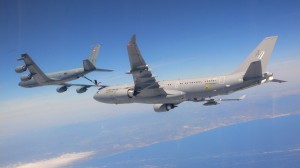
A French Air Force KC-135 (much like what the US military uses today) refuels a Royal Australian Air Force A330
With every competition, there will inevitably be a winner and a loser. Although there is a lot of excitement in the Seattle area that Boeing won the Air Force tanker contract with their 767 (KC-46A) aircraft, there are many in the Mobile, Alabama area who are very disappointed. If they won the contract, EADS planned to build their Airbus A330 based tanker (the KC-45) in Mobile. There is no word yet if EADS will appeal the decision, but they did post a statement on their website about the tanker selection. Here is their statement in full:
EADS North America statement concerning U.S. Air Force Tanker selection
Arlington, Virginia, 24 February 2011
EADS North America officials today expressed disappointment and concern over the announcement by the U.S. Air Force that it had selected a high-risk, concept aircraft over the proven, more capable KC-45 for the nation’s next aerial refueling tanker.
’œThis is certainly a disappointing turn of events, and we look forward to discussing with the Air Force how it arrived at this conclusion,’ said EADS North America Chairman Ralph D. Crosby, Jr. ’œFor seven years our goal has been to provide the greatest capability to our men and women in uniform, and to create American jobs by building the KC-45 here in the U.S. We remain committed to those objectives.’
If selected, EADS North America had committed to build the KC-45 at a new production facility in Mobile, Alabama, with a U.S. supplier base of nearly a thousand American companies.
’œWith a program of such complexity, our review of today’s decision will take some time,’ Crosby said. ’œThere are more than 48,000 Americans who are eager to build the KC-45 here in the U.S., and we owe it to them to conduct a thorough analysis.’
’œThough we had hoped for a different outcome, it’s important to remember that this is one business opportunity among many for EADS in the United States,’ said Sean O’Keefe, CEO of EADS North America. ’œWe have exceptional technology and highly capable platforms that will be invaluable to U.S. military forces, now and in the future. We have learned much through this process, developed a world-class organization in the U.S. and have earned the respect of the Department of Defense. Our commitment to our U.S. customers is stronger than ever.’
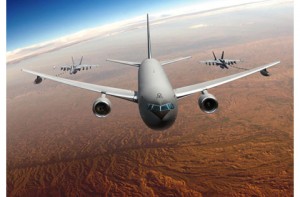
Boeing 767 tanker, refueling two F/A-18's
The United States Air Force has announced today that they have granted the tanker contract to Boeing and their 767 aircraft, which will be called the KC-46A. The Air Force is asking Boeing to deliver the first 18 aircraft by 2017.
This has been a heated battle between Boeing and EADS (the parent company of Airbus) for the contract worth $35billion dollars and 179 airplanes. Currently the Air Force has about 400 KC-135s currently used as tankers.Back in 2008, the Air Force initially gave the deal to EADS and their partner at the time Northrop Grumman. Since there were complaints about the bidding process, the whole process had to be started over again.
The Boeing 767 will be built in Everett, WA and modified for tanker duty in Wichita, KA. Washington representative Norm Dicks told Glenn Farely of KING5, “I am so excited that we finally won this after three go-arounds. It’s just the most important victory for Boeing, for the workers of our state.”
Although the decision has been made, it can still be appealed. At this point, I hope it does not get appealed so our troops can start getting new aircraft.
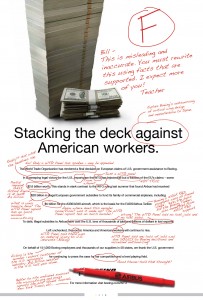
Airbus had a few edits on Boeing's ad. Very creative. Click for larger.
For quite sometime the tension between Boeing and Airbus over the tanker deal and subsidies has created tension. More recently, it seems maybe they are going too far on Twitter, advertisements and comments made.
With Boeing (@Boeing & @BoeingAirplanes) and Airbus (@AirbusInTheUS) recently getting on Twitter, it has become interesting seeing some of the volleys that go back and forth between the companies. Things have been pretty friendly, until news on subsidies surfaced.
I really don’t feel like hashing out all the subsidy stuff, but the bottom line is Boeing accused Airbus of taking illegal subsidies. The World Trade Organization (WTO) found that Airbus took $20billion in illegal subsidies. Boeing has come out pretty saying, “we told you so” (that’s a paraphrase). Then it became Airbus’ turn and now they are stating that the WTO has found Boeing also took illegal subsidies. There is a lot more going on, so if you aren’t up to date, check out Flight Global’s WTO page.
Airbus released the findings on January 31st and during the day they produced nine Tweets talking about the WTO findings and in many, talking directly to Boeing. For example (help with Twitter lingo):
@AirbusInTheUS: “Confused by #Boeing claims that WTO found Airbus got $20B in illegal subsidies? Us too. Here’s the report. http://ow.ly/3NExm No such #’s.”
Okay, I can see one, but nine Tweets? It seemed to be a little much for me. I see Twitter as a way for companies to relate to their customers, not a place to complain directly about a competitor. Sure, if you are Tweeting for yourself, not a company, complain away, but representing a company is something different. You don’t see United Airlines calling out Delta Air Lines on Twitter — it is kept professional as it should.
Boeing also talked about the WTO reports, but were not directly talking to Airbus. Boeing’s approach seems very different to me. Here is an example of Boeing’s tweet on January 31st:
@Boeing: “#Boeing statement on #WTO decision reports http://bit.ly/gRUgXM #Airbus,” and “Video: #Boeing trade expert discusses #WTO www.boeing.com/wto”
I understand that Airbus might have some built up frustration. Not only did Boeing accuse them of getting subsidies and they find Boeing did too, but there is a lot of emotion around the US military tanker deal. The tanker deal has been plagued with delays, decision changes and some pretty messed up situations.
Boeing placed an ad in DC-area newspapers about the subsidies and tweeted it on February 3rd. That Tweet, caused Airbus to respond with two Tweets arguing that the ad was misleading (Tweet1 and 2). But Airbus didn’t stop there. They took Boeing’s ad and made some edits and placed their revised ad in a newsletter targeting the folks on Capital Hill in Washington, DC (see photo with this blog). It seems like Airbus’ edits bring up some interesting points and questions.
In a way, Boeing has an advantage since they have three separate Twitter accounts (their third is on defense). I think this separation was wise. The @BoeingAirplanes has been the more light and “fun” account, connecting with Boeing fans and direct customers. The other two are able to take the brunt of the controversy and have more of a serious tone. Since Airbus only has one feed, it can be difficult to read a serious tweet one second, then the next learning how many ping pong balls can fit into an A380 (by the way, it is 35million). Boeing has also been in the defense business much longer than EADS (the parent company of Airbus). Boeing has been able to learn the ins and outs of defense communications and even has had a lead with social media.
Although Twitter for the two has seemed to calm down, both airline manufactures are still participating in public conflict . EADS North America Chairman Ralph Crosby Jr. recently stated he feels that Boeing cares more about winning the tanker than American troops getting the best product. ’œOur campaign has been based on enabling the understanding of the superior capabilities and value of our system under the rules that are established. And what I see in terms of advertisement and sort of third-party and paid surrogate statements is that, well, whatever (Boeing executives) do, they may or may not win, but they sure want to keep us from winning and, frankly, from my perspective, if that’s anybody’s approach then I think it’s irresponsible to the warfighters.’
Boeing tanker spokesman Bill Barksdale responded by saying, ’œRather than take shots at our European competitor, the Boeing Company continues to focus on being ready to build tankers if we’re honored with a selection and contract award. The selfless men and women of America’s Air Force deserve no less.’
I know there are a lot of complexities and politics involved with this deal, but it seems to me that both companies are spending too much time concerned about insulting the other. That time, effort and money might be used more wisely to work on their own airplane programs.
I think both companies are still in the learning phases of social media. I just hope that whichever company loses the final contract for the tanker can graciously admit defeat and wish the winner the best of luck. I know in the “real” world, that might be too much to ask, but I think in social media, anything is possible.
Image: Seattle PI
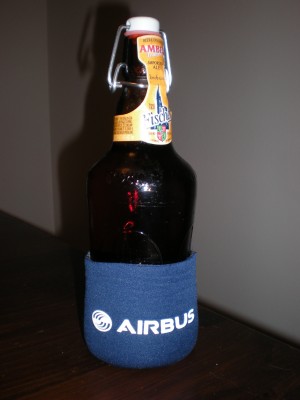
Check out this sweet Airbus Koozie with a French beer
Airbus has slightly updated their logo. It might take a true airline nerd to see the difference at first. Don’t worry, the iconic ball and the blue has stayed the same, however they updated the look of their font to be more modern.
Unfortunately, they didn’t have any large-sized version of the new logo when they announced it, but one Airbus employee (who I shall call Jon — since that is his name) sent me a nice koozie with the new Airbus logo.
So here you go. The new Airbus logo — I like it. I also like that French beer (yea, it is a little big, but it is the only French beer I could find). Time to celebrate the koozie! Cheers and thanks Jon!
Check this bigger and closer shot of the new logo.
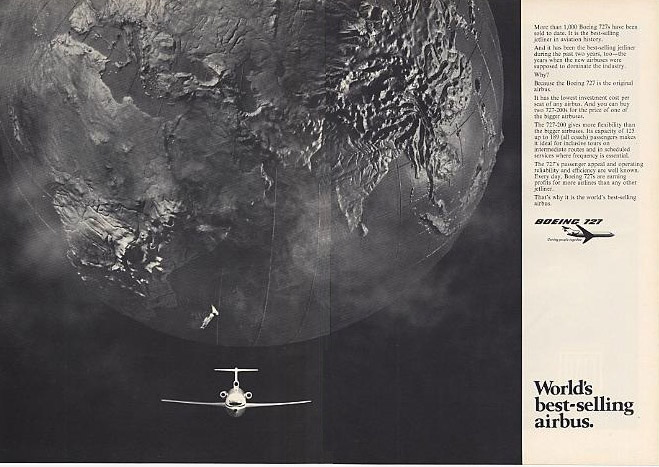
Boeing had this ad stating that the Boeing 727 is the best-selling air bus
Yesterday I posted the corner of the ad showing “World’s best-selling airbus,” and asked what ad did it go to. A few people guessed (mostly via Twitter) that it was an Airbus A300, Boeing 737 or Boeing 747. Only two people (@CraigSymons and @SkippysCage) guessed it correctly: the Boeing 727. This was the best quality of the ad I could find and it is difficult to read the text, but I am pretty sure it says:
“More than 1,000 Boeing 727s have been sold to date. It is the best-selling jetliner in aviation history.
And it has been the best-selling jetliner during the past two years — the years when the new airbuses were supposed to dominate the industry.
Why?
Because the Boeing 727 is the original airbus.
It has the lowest investment, cost per seat of any airbus. And you can buy two 727-200s for the price of one of the bigger airbuses.
The 727-200 gives more flexibility than the bigger airbuses. Its capacity of 125, up to 189 (all coach), passengers makes it ideal for ??? on intermediate routes and in scheduled services where frequency is essential.
The 727s passenger appeal and operating reliability and efficiency are well known. Everyday, Boeing 727s are earning profit for more airlines than any other jetline.
That’s why it is the world’s best-selling airbus.”
Obviously a jab at the new Airbus Industry, but I find it quite humorous.
Thanks David for showing this to me!
connect | web | twitter | facebook |




